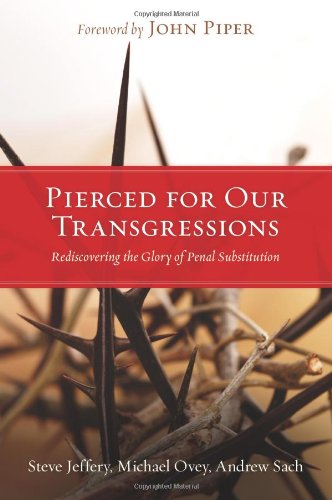We want to draw your attention again to this wonderful book on the substitutionary nature of the death of Christ. In chapter 2 the authors examined a number of passages that present the death of Christ as that of a penal substitute (Exod. 12; Lev. 16; Isa. 52:13 – 53:12; Mark; John; Rom. 3:21–26; Gal. 3:10–13; 1 Pet., especially 2:24 and 3:18). Later in chapter three they summarize two important conclusions, which we cite for you here.
From chapter 3
First, Jesus bore the penal consequences of sin when he died. As Isaiah puts it, ‘the punishment that brought us peace was upon him’ (53:5; italics added). Elsewhere it was clear that God’s wrath was poured out on his Son; for example, in the powerful Old Testament imagery of ‘the cup’ picked up in Mark 14:36 (cf. Ps. 75:8; Isa. 51:17–23; Jer. 25:15–29; Ezek. 23:31–34). That Jesus should die at all hints at his bearing sin’s curse, for death only entered human experience on account of sin (Rom. 5:12). But the passages we explored in chapter 2 go further. Jesus experienced more than just physical death. In his cry of dereliction there are echoes of exclusion, reminiscent of Adam and Eve’s eviction from Eden or Israel’s exile from the Promised Land.
Secondly, Jesus bore the consequences of our sin in our place, as a substitute. It was a case of ‘exclusive place-taking’. That is, he did not merely share in the punishment we deserve; he bore it instead of us. Thus Isaiah testified, ‘he was pierced for our transgressions’ (53:5). He had no guilt of his own, being innocent, but our guilt was imputed to him, and for this he suffered and died. As 2 Corinthians 5:21 puts it, ‘God made him who had no sin to be sin for us, so that in him we might become the righteousness of God.’
It is because Christ bore God’s wrath in our place that he is able to save us from it. The apostle Paul speaks of ‘Jesus, who rescues us from the coming wrath’ (1 Thess. 1:10). Or again, ‘Since we have now been justified by his blood, how much more shall we be saved from God’s wrath through him!’ (Rom. 5:9).
Buy the books

Pierced for Our Transgressions